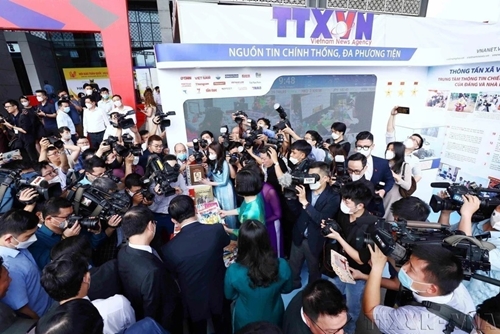Hang spotlighted the roots of Vietnam’s revolutionary press to the founding of Thanh Nien (Young People) Newspaper in 1925 by Nguyen Ai Quoc, later known as Ho Chi Minh, saying that it has become a core force on the ideological and cultural front, standing shoulder to shoulder with the Vietnamese revolution through every twist of storied past.
    |
 |
|
A view of the National Press Festival in 2025 |
Today, the press for foreign service has evolved into a distinct, irreplaceable force, bridging Vietnam with the world and portraying a nation that is stable, peace-loving, and fully integrated into the international community.
It has also become a sharp-edged tool in the battle of public opinion, promptly countering misinformation and distortion about Vietnam’s domestic and foreign affairs, thereby safeguarding national interests and reputation on the global stage.
Throughout history, she said, the press for foreign service has taken the lead in amplifying Vietnam’s voice of justice, asserting its unwavering stance on independence, sovereignty, and territorial integrity, while promoting a consistent and responsible foreign policy. Notable recent achievements, such as efficient media coverage of activities within Vietnam’s 2020 ASEAN Chairmanship, the U.S.-DPRK Summit in Hanoi, the 26th United Nations Climate Change Conference (COP26), and the country’s tenure as a non-permanent member of the UN Security Council, are evidence of the professionalism, strategic vision, and maturity of the Vietnamese press for foreign service.
In a world where information is a strategic asset, Hang dubbed the press for foreign service as an “elite force” essential to Vietnam’s national strength. She underscored the opportunities of the digital age, where platforms and social media enable rapid, cost-effective outreach to global audiences. But it’s a high-stakes game. Misinformation spreads like wildfire, and global media is a battlefield for influence and credibility. One false narrative could spell diplomatic or economic trouble, she warned.
Citing the Politburo’s Conclusion No.57-KL/TW, which calls for accurate, objective and timely information, blending traditional and modern communication tools while aligning political diplomacy with international media outreach, she described it as a guiding compass for all external media activities in the new era.
The press for foreign service is a form of “soft-power combat”, she insisted, urging journalists to be “versatile soldiers” who should be quick in accessing and processing information, sharp in critical thinking, steadfast in political mettle and proficient in modern communication technology.
Drawing on her experience in Vietnam’s diplomatic missions, Hang made a plea to journalists: “Tell the story of a Vietnam that is transforming, confident, and charging onto the world stage".
At the same time, she also urged government agencies and press management agencies to step up their practical support through training, technological investment, and expanded international cooperation.
Source: VNA